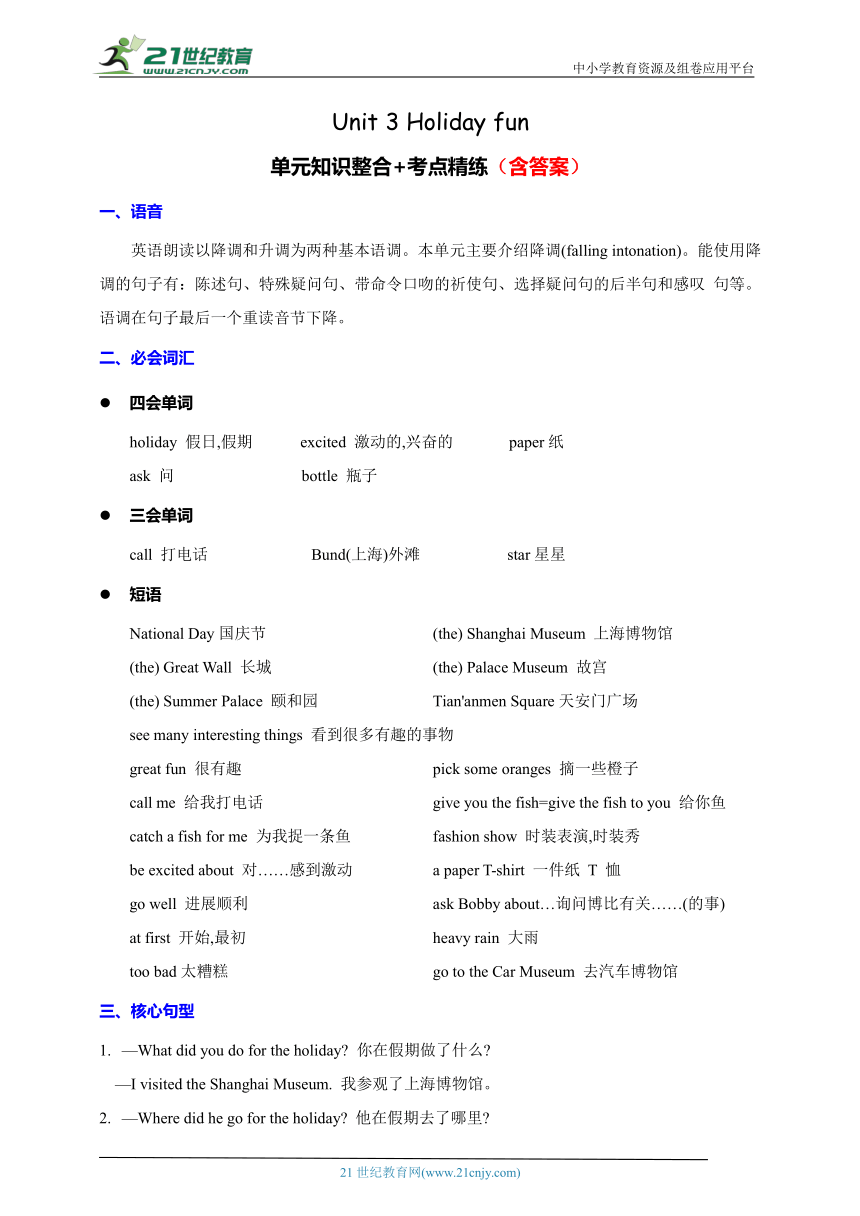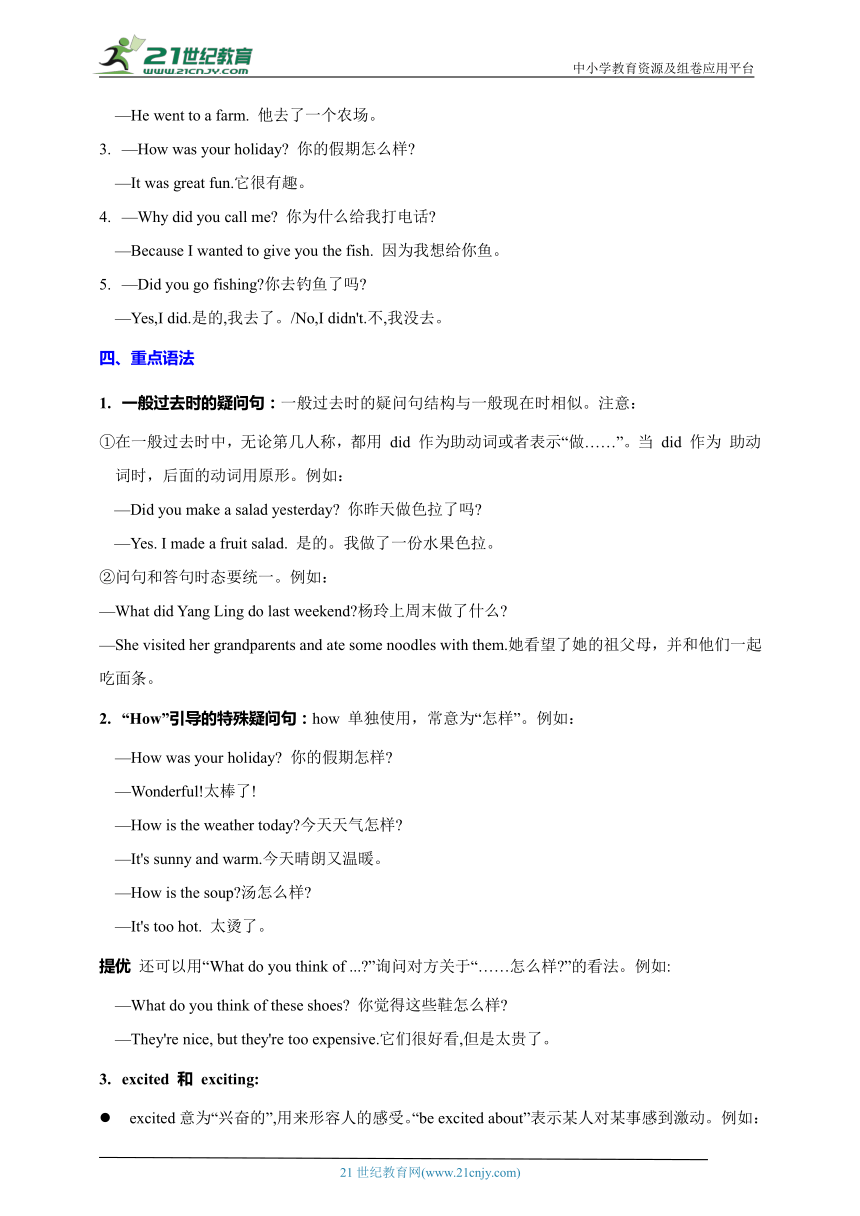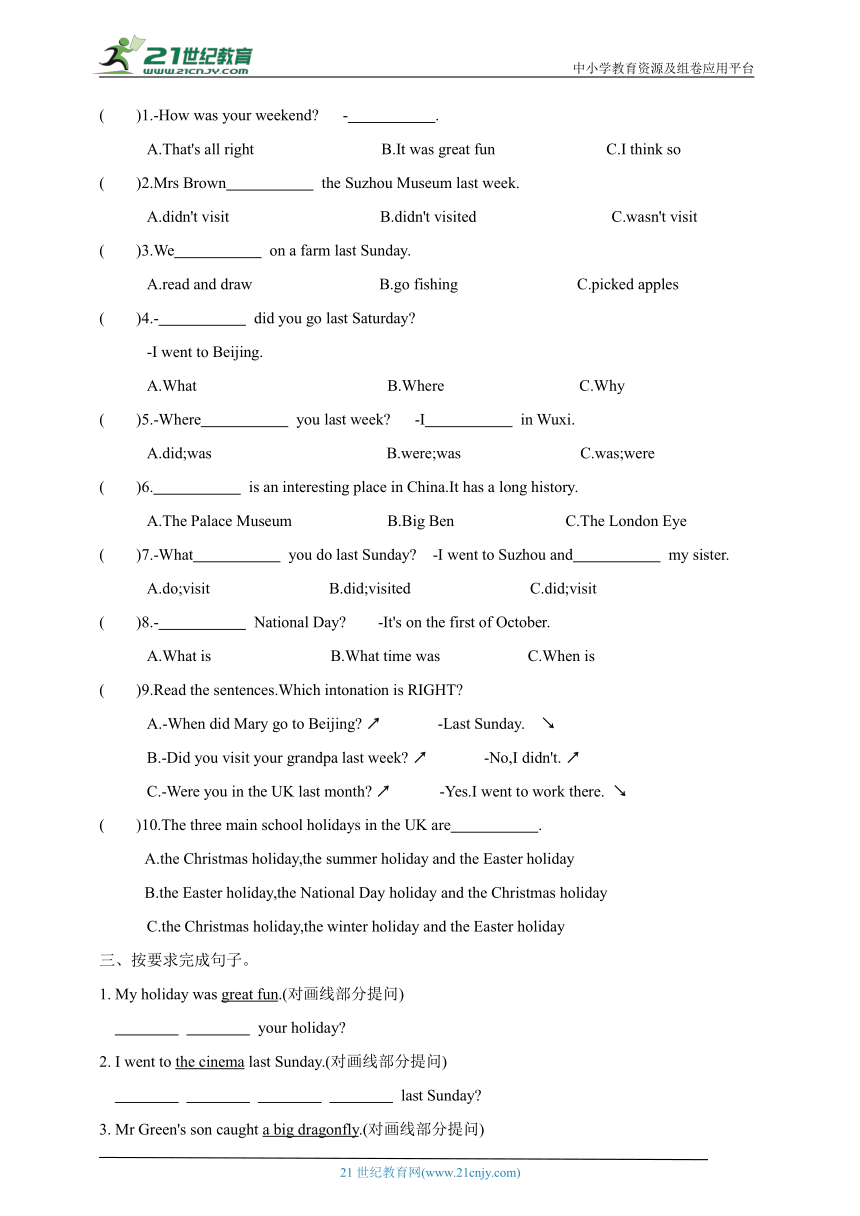Unit 3 Holiday fun知识梳理+考点精练(含答案)
文档属性
| 名称 | Unit 3 Holiday fun知识梳理+考点精练(含答案) |

|
|
| 格式 | doc | ||
| 文件大小 | 1.3MB | ||
| 资源类型 | 试卷 | ||
| 版本资源 | 牛津译林版 | ||
| 科目 | 英语 | ||
| 更新时间 | 2023-11-08 00:00:00 | ||
图片预览




文档简介
中小学教育资源及组卷应用平台
Unit 3 Holiday fun
单元知识整合+考点精练(含答案)
语音
英语朗读以降调和升调为两种基本语调。本单元主要介绍降调(falling intonation)。能使用降调的句子有:陈述句、特殊疑问句、带命令口吻的祈使句、选择疑问句的后半句和感叹 句等。语调在句子最后一个重读音节下降。
必会词汇
四会单词
holiday 假日,假期 excited 激动的,兴奋的 paper纸
ask 问 bottle 瓶子
三会单词
call 打电话 Bund(上海)外滩 star星星
短语
National Day国庆节 (the) Shanghai Museum 上海博物馆
(the) Great Wall 长城 (the) Palace Museum 故宫
(the) Summer Palace 颐和园 Tian'anmen Square天安门广场
see many interesting things 看到很多有趣的事物
great fun 很有趣 pick some oranges 摘一些橙子
call me 给我打电话 give you the fish=give the fish to you 给你鱼
catch a fish for me 为我捉一条鱼 fashion show 时装表演,时装秀
be excited about 对……感到激动 a paper T-shirt 一件纸 T 恤
go well 进展顺利 ask Bobby about…询问博比有关……(的事)
at first 开始,最初 heavy rain 大雨
too bad太糟糕 go to the Car Museum 去汽车博物馆
核心句型
—What did you do for the holiday 你在假期做了什么
—I visited the Shanghai Museum. 我参观了上海博物馆。
—Where did he go for the holiday 他在假期去了哪里
—He went to a farm. 他去了一个农场。
—How was your holiday 你的假期怎么样
—It was great fun.它很有趣。
—Why did you call me 你为什么给我打电话
—Because I wanted to give you the fish. 因为我想给你鱼。
—Did you go fishing 你去钓鱼了吗
—Yes,I did.是的,我去了。/No,I didn't.不,我没去。
重点语法
一般过去时的疑问句:一般过去时的疑问句结构与一般现在时相似。注意:
①在一般过去时中,无论第几人称,都用 did 作为助动词或者表示“做……”。当 did 作为 助动词时,后面的动词用原形。例如:
—Did you make a salad yesterday 你昨天做色拉了吗
—Yes. I made a fruit salad. 是的。我做了一份水果色拉。
②问句和答句时态要统一。例如:
—What did Yang Ling do last weekend 杨玲上周末做了什么
—She visited her grandparents and ate some noodles with them.她看望了她的祖父母,并和他们一起吃面条。
“How”引导的特殊疑问句:how 单独使用,常意为“怎样”。例如:
—How was your holiday 你的假期怎样
—Wonderful!太棒了!
—How is the weather today 今天天气怎样
—It's sunny and warm.今天晴朗又温暖。
—How is the soup 汤怎么样
—It's too hot. 太烫了。
提优 还可以用“What do you think of ... ”询问对方关于“……怎么样 ”的看法。例如:
—What do you think of these shoes 你觉得这些鞋怎么样
—They're nice, but they're too expensive.它们很好看,但是太贵了。
excited 和 exciting:
excited意为“兴奋的”,用来形容人的感受。“be excited about”表示某人对某事感到激动。 例如:
She is excited about the art show. 她为艺术展览感到激动。
exciting 用来形容事物,表示某事物令人感到激动。例如:
The final race is exciting. 最后决赛令人激动。
同理, interesting 表示事物很有趣。be interested in 表示某人对某事感兴趣。例如:
The storybook is very interesting. 这本故事书很有趣。
Su Hai is interested in this storybook.苏海对这本故事书感兴趣。
文化常识
我们主要的学校假期为寒假(the winter holiday/vacation)和暑假(the summer holiday/ vacation)。 表示某人正在度假,可以用“be on holiday”。 表达去远足、出游,可以用“go/be on an outing”。
Unit 3 Holiday fun考题精练
一、用所给词的适当形式填空。
1.—What you (do) this morning -I watered the trees.
2.— Wang Bing (swim) last Saturday -No,he didn't.
3.Last week,I (go) to the cinema and (watch) a fairy film.
4.Look! David Chinese in the study.He often Chinese on Saturdays.(study)
5. Could you please bring me some white (paper)
6.—How (be) the trip to New Zealand(新西兰) —It was cool.
7. There are many (bottle) on the floor. (pick) them up, Bobby.
8. Mike’s mother (ask) him (clean) the kitchen last weekend.
9.— you (have) a fashion show last night
—Yes. I like fashion (show).
10.—Taotao, where (be) your paper shorts
—I (give) them to John yesterday morning.
11.They (eat) a lot of nice food at the party last Friday.
12.I (visit) the Summer Palace with my family last summer holiday.
13. (be) your sisters at home yesterday,George
14.I'd like (pick) some mangoes for you.
15.The students are very (excite).They're reading an (interest) story.
三、单项选择。
( )1.-How was your weekend - .
A.That's all right B.It was great fun C.I think so
( )2.Mrs Brown the Suzhou Museum last week.
A.didn't visit B.didn't visited C.wasn't visit
( )3.We on a farm last Sunday.
A.read and draw B.go fishing C.picked apples
( )4.- did you go last Saturday
-I went to Beijing.
A.What B.Where C.Why
( )5.-Where you last week -I in Wuxi.
A.did;was B.were;was C.was;were
( )6. is an interesting place in China.It has a long history.
A.The Palace Museum B.Big Ben C.The London Eye
( )7.-What you do last Sunday -I went to Suzhou and my sister.
A.do;visit B.did;visited C.did;visit
( )8.- National Day -It's on the first of October.
A.What is B.What time was C.When is
( )9.Read the sentences.Which intonation is RIGHT
A.-When did Mary go to Beijing ↗ -Last Sunday. ↘
B.-Did you visit your grandpa last week ↗ -No,I didn't. ↗
C.-Were you in the UK last month ↗ -Yes.I went to work there. ↘
( )10.The three main school holidays in the UK are .
A.the Christmas holiday,the summer holiday and the Easter holiday
B.the Easter holiday,the National Day holiday and the Christmas holiday
C.the Christmas holiday,the winter holiday and the Easter holiday
三、按要求完成句子。
1. My holiday was great fun.(对画线部分提问)
your holiday
2. I went to the cinema last Sunday.(对画线部分提问)
last Sunday
3. Mr Green's son caught a big dragonfly.(对画线部分提问)
Mr Green’s son
4. I went to the UK because I wanted to visit the London Eye.(对画线部分提问)
the UK
5.They saw many interesting things in the museum.(对画线部分提问)
they in the museum
6.Mr Smith went to London for the holiday.(对画线部分提问)
Mr Smith for the holiday
7.My grandma gave me a beautiful doll on my birthday.(改为同义句)
My grandma a beautiful doll on my birthday.
四、完形填空。
I like travelling. Last summer holiday, I flew to 1 with my mother. When we got 2 there and walked out of the London Heathrow Airport,we saw so many interesting things that I began to 3 . Suddenly, in the front garden,we 4 a beautiful house with a lot of flowers. And a kind old man 5 . He invited us to have tea in his house. After going into his house, we saw his wife. Then, the old man showed some pictures 6 us. He drew them.We also read some books, and he 7 these books. What a clever man! We talked 8 and had a good time. Finally, it was time to say goodbye. We all felt sad.
( )1.A.England B.Canada C.America D.China
( )2.A.to B./ C.in D.at
( )3.A.keep quiet B.turn left C.take photos D.tell stories
( )4.A.looked B.see C.saw D.smelled
( )5.A.got up B.got off C.got together D.got out
( )6.A.for B.to C.around D.with
( )7.A.told B.found C.wrote D.read
( )8.A.a lot of B.lot C.a lot D.lots of
参考答案
一、1.did,do 2.Did,swim 3.went,watched 4.is studying,studies 5.paper 6.was
7.bottles, Pick 8.asked, to clean 9.Did, have, shows 10.are, gave
1l.ate. 12.visited 13.Were 14.to pick 15.excited,interesting
二、1.B
2.A解析:由last week可知,此句的时态是一般过去时,需要用助动词did与否定词not连用,后面接动词原形。故选A。
3.C 4.B 5.B 6.A
7.B解析:由last Sunday可知,间句的时态是一般过去时,所以用助动词did帮助构成疑问句;and用于连接两个动词短语时,两个动词的时态要保持一致。故选B。
8.C
9.C解析:在英语中,陈述句、祈使句和特殊疑问句在朗读时通常用降调,一般疑问句通常用升调。故选C。
10.A
三、1.How was 2.Where did you go 3.What did, catch 4.Why did you go to
5.What, did, see 6.Where did, go 7.gave, to me
四、1.A解析:由下文中“and walked out of the London Heathrow Airport'”可知,作者去的是英格兰。故选A。
2.B解析:there是地点副词,与动词get连用时,中间不加任何介词。故选B。
3.C解析:联系上下文可知,他们走出机场后,看到了很多有趣的东西,于是开始拍照。故选C。
4.C
5.D解析:get up意为“起床”;get off意为下车”;get together意为“团聚”;get out意为“出来”。联系上下文可知,此处是指一位老人从漂亮的房子里出来。故选D。
6.B 7.C
8.C解析:a lot of和lots of常用于修饰名词,a lot常用于修饰动词。故选C。
HYPERLINK "http://21世纪教育网(www.21cnjy.com)
" 21世纪教育网(www.21cnjy.com)
Unit 3 Holiday fun
单元知识整合+考点精练(含答案)
语音
英语朗读以降调和升调为两种基本语调。本单元主要介绍降调(falling intonation)。能使用降调的句子有:陈述句、特殊疑问句、带命令口吻的祈使句、选择疑问句的后半句和感叹 句等。语调在句子最后一个重读音节下降。
必会词汇
四会单词
holiday 假日,假期 excited 激动的,兴奋的 paper纸
ask 问 bottle 瓶子
三会单词
call 打电话 Bund(上海)外滩 star星星
短语
National Day国庆节 (the) Shanghai Museum 上海博物馆
(the) Great Wall 长城 (the) Palace Museum 故宫
(the) Summer Palace 颐和园 Tian'anmen Square天安门广场
see many interesting things 看到很多有趣的事物
great fun 很有趣 pick some oranges 摘一些橙子
call me 给我打电话 give you the fish=give the fish to you 给你鱼
catch a fish for me 为我捉一条鱼 fashion show 时装表演,时装秀
be excited about 对……感到激动 a paper T-shirt 一件纸 T 恤
go well 进展顺利 ask Bobby about…询问博比有关……(的事)
at first 开始,最初 heavy rain 大雨
too bad太糟糕 go to the Car Museum 去汽车博物馆
核心句型
—What did you do for the holiday 你在假期做了什么
—I visited the Shanghai Museum. 我参观了上海博物馆。
—Where did he go for the holiday 他在假期去了哪里
—He went to a farm. 他去了一个农场。
—How was your holiday 你的假期怎么样
—It was great fun.它很有趣。
—Why did you call me 你为什么给我打电话
—Because I wanted to give you the fish. 因为我想给你鱼。
—Did you go fishing 你去钓鱼了吗
—Yes,I did.是的,我去了。/No,I didn't.不,我没去。
重点语法
一般过去时的疑问句:一般过去时的疑问句结构与一般现在时相似。注意:
①在一般过去时中,无论第几人称,都用 did 作为助动词或者表示“做……”。当 did 作为 助动词时,后面的动词用原形。例如:
—Did you make a salad yesterday 你昨天做色拉了吗
—Yes. I made a fruit salad. 是的。我做了一份水果色拉。
②问句和答句时态要统一。例如:
—What did Yang Ling do last weekend 杨玲上周末做了什么
—She visited her grandparents and ate some noodles with them.她看望了她的祖父母,并和他们一起吃面条。
“How”引导的特殊疑问句:how 单独使用,常意为“怎样”。例如:
—How was your holiday 你的假期怎样
—Wonderful!太棒了!
—How is the weather today 今天天气怎样
—It's sunny and warm.今天晴朗又温暖。
—How is the soup 汤怎么样
—It's too hot. 太烫了。
提优 还可以用“What do you think of ... ”询问对方关于“……怎么样 ”的看法。例如:
—What do you think of these shoes 你觉得这些鞋怎么样
—They're nice, but they're too expensive.它们很好看,但是太贵了。
excited 和 exciting:
excited意为“兴奋的”,用来形容人的感受。“be excited about”表示某人对某事感到激动。 例如:
She is excited about the art show. 她为艺术展览感到激动。
exciting 用来形容事物,表示某事物令人感到激动。例如:
The final race is exciting. 最后决赛令人激动。
同理, interesting 表示事物很有趣。be interested in 表示某人对某事感兴趣。例如:
The storybook is very interesting. 这本故事书很有趣。
Su Hai is interested in this storybook.苏海对这本故事书感兴趣。
文化常识
我们主要的学校假期为寒假(the winter holiday/vacation)和暑假(the summer holiday/ vacation)。 表示某人正在度假,可以用“be on holiday”。 表达去远足、出游,可以用“go/be on an outing”。
Unit 3 Holiday fun考题精练
一、用所给词的适当形式填空。
1.—What you (do) this morning -I watered the trees.
2.— Wang Bing (swim) last Saturday -No,he didn't.
3.Last week,I (go) to the cinema and (watch) a fairy film.
4.Look! David Chinese in the study.He often Chinese on Saturdays.(study)
5. Could you please bring me some white (paper)
6.—How (be) the trip to New Zealand(新西兰) —It was cool.
7. There are many (bottle) on the floor. (pick) them up, Bobby.
8. Mike’s mother (ask) him (clean) the kitchen last weekend.
9.— you (have) a fashion show last night
—Yes. I like fashion (show).
10.—Taotao, where (be) your paper shorts
—I (give) them to John yesterday morning.
11.They (eat) a lot of nice food at the party last Friday.
12.I (visit) the Summer Palace with my family last summer holiday.
13. (be) your sisters at home yesterday,George
14.I'd like (pick) some mangoes for you.
15.The students are very (excite).They're reading an (interest) story.
三、单项选择。
( )1.-How was your weekend - .
A.That's all right B.It was great fun C.I think so
( )2.Mrs Brown the Suzhou Museum last week.
A.didn't visit B.didn't visited C.wasn't visit
( )3.We on a farm last Sunday.
A.read and draw B.go fishing C.picked apples
( )4.- did you go last Saturday
-I went to Beijing.
A.What B.Where C.Why
( )5.-Where you last week -I in Wuxi.
A.did;was B.were;was C.was;were
( )6. is an interesting place in China.It has a long history.
A.The Palace Museum B.Big Ben C.The London Eye
( )7.-What you do last Sunday -I went to Suzhou and my sister.
A.do;visit B.did;visited C.did;visit
( )8.- National Day -It's on the first of October.
A.What is B.What time was C.When is
( )9.Read the sentences.Which intonation is RIGHT
A.-When did Mary go to Beijing ↗ -Last Sunday. ↘
B.-Did you visit your grandpa last week ↗ -No,I didn't. ↗
C.-Were you in the UK last month ↗ -Yes.I went to work there. ↘
( )10.The three main school holidays in the UK are .
A.the Christmas holiday,the summer holiday and the Easter holiday
B.the Easter holiday,the National Day holiday and the Christmas holiday
C.the Christmas holiday,the winter holiday and the Easter holiday
三、按要求完成句子。
1. My holiday was great fun.(对画线部分提问)
your holiday
2. I went to the cinema last Sunday.(对画线部分提问)
last Sunday
3. Mr Green's son caught a big dragonfly.(对画线部分提问)
Mr Green’s son
4. I went to the UK because I wanted to visit the London Eye.(对画线部分提问)
the UK
5.They saw many interesting things in the museum.(对画线部分提问)
they in the museum
6.Mr Smith went to London for the holiday.(对画线部分提问)
Mr Smith for the holiday
7.My grandma gave me a beautiful doll on my birthday.(改为同义句)
My grandma a beautiful doll on my birthday.
四、完形填空。
I like travelling. Last summer holiday, I flew to 1 with my mother. When we got 2 there and walked out of the London Heathrow Airport,we saw so many interesting things that I began to 3 . Suddenly, in the front garden,we 4 a beautiful house with a lot of flowers. And a kind old man 5 . He invited us to have tea in his house. After going into his house, we saw his wife. Then, the old man showed some pictures 6 us. He drew them.We also read some books, and he 7 these books. What a clever man! We talked 8 and had a good time. Finally, it was time to say goodbye. We all felt sad.
( )1.A.England B.Canada C.America D.China
( )2.A.to B./ C.in D.at
( )3.A.keep quiet B.turn left C.take photos D.tell stories
( )4.A.looked B.see C.saw D.smelled
( )5.A.got up B.got off C.got together D.got out
( )6.A.for B.to C.around D.with
( )7.A.told B.found C.wrote D.read
( )8.A.a lot of B.lot C.a lot D.lots of
参考答案
一、1.did,do 2.Did,swim 3.went,watched 4.is studying,studies 5.paper 6.was
7.bottles, Pick 8.asked, to clean 9.Did, have, shows 10.are, gave
1l.ate. 12.visited 13.Were 14.to pick 15.excited,interesting
二、1.B
2.A解析:由last week可知,此句的时态是一般过去时,需要用助动词did与否定词not连用,后面接动词原形。故选A。
3.C 4.B 5.B 6.A
7.B解析:由last Sunday可知,间句的时态是一般过去时,所以用助动词did帮助构成疑问句;and用于连接两个动词短语时,两个动词的时态要保持一致。故选B。
8.C
9.C解析:在英语中,陈述句、祈使句和特殊疑问句在朗读时通常用降调,一般疑问句通常用升调。故选C。
10.A
三、1.How was 2.Where did you go 3.What did, catch 4.Why did you go to
5.What, did, see 6.Where did, go 7.gave, to me
四、1.A解析:由下文中“and walked out of the London Heathrow Airport'”可知,作者去的是英格兰。故选A。
2.B解析:there是地点副词,与动词get连用时,中间不加任何介词。故选B。
3.C解析:联系上下文可知,他们走出机场后,看到了很多有趣的东西,于是开始拍照。故选C。
4.C
5.D解析:get up意为“起床”;get off意为下车”;get together意为“团聚”;get out意为“出来”。联系上下文可知,此处是指一位老人从漂亮的房子里出来。故选D。
6.B 7.C
8.C解析:a lot of和lots of常用于修饰名词,a lot常用于修饰动词。故选C。
HYPERLINK "http://21世纪教育网(www.21cnjy.com)
" 21世纪教育网(www.21cnjy.com)
